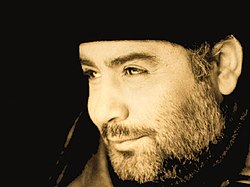Ahmet Kaya: Difference between revisions
m →Discography: fix |
|||
| Line 81: | Line 81: | ||
==External links== |
==External links== |
||
*[http://www.kurdnetwork.com/ahmet-kaya/ Kurdnetwork Official Page: Ahmet Kaya ] |
|||
*{{Fr icon}} [http://www.institutkurde.org/activites_culturelles/hommage/ahmet_kaya/ His biographical information by Kurdish Institute of Paris] |
*{{Fr icon}} [http://www.institutkurde.org/activites_culturelles/hommage/ahmet_kaya/ His biographical information by Kurdish Institute of Paris] |
||
*[http://www.asyaradyo.com/portal/modules.php?name=News&file=article&sid=600 Asya Radyo :Devlet Ahmet Kaya'dan özür dilemeli haberi...] |
*[http://www.asyaradyo.com/portal/modules.php?name=News&file=article&sid=600 Asya Radyo :Devlet Ahmet Kaya'dan özür dilemeli haberi...] |
||
Revision as of 17:48, 4 May 2014
Ahmet Kaya | |
|---|---|
 | |
| Background information | |
| Born | 28 October 1957[1] Malatya, Turkey |
| Died | November 16, 2000 (aged 43) Paris, France |
| Genres | Turkish folk music |
| Occupation(s) | Musician, poet |
| Instrument(s) | Bağlama, Singing |
| Years active | 1985–2000 |
| Website | www.ahmetkaya.com |
Ahmet Kaya (October 28, 1957[1] – November 16, 2000) was an Kurdish singer from Malatya, Turkey, who died on November 16, 2000 in exile in Paris.[2] He sang in Turkish and Kurdish. Some of his most popular songs include Ayrılık Vakti, Söyle, Ağladıkça, Oy Benim Canım, Birazdan Kudurur Deniz, Arka Mahalle, Kum Gibi, Nereden Bileceksiniz, Hani Benim Gençliğim, Yakarım Geceleri and Şafak Türküsü.
Career
Ahmet Kaya was the fifth and last child born to his father, a Kurd who had immigrated from Adıyaman to Malatya, and his Turkish mother. He first encountered music at the age of six. Ahmet Kaya worked for a while as a taxicab driver in Istanbul before becoming well known as a singer in the mid-1980s.
His first album, Ağlama Bebeğim, was released in 1985. His popularity continued to rise into the 1990s when in 1994 he released the album Şarkılarım Dağlara which sold a record copies. All of his 1990 albums became chart-toppers.
During his career he recorded approximately 20 albums and was known for his protest music and positions on social justice. Recurring themes in his songs are love towards one's mother, sacrifice, and hope.
Awards controversy
On 10 February 1999 during the televised annual music awards ceremony, SHOW TV, at which he was to be named Musician of the Year, Kaya spoke out about his Kurdish background and said that he wanted to produce music in his native Kurdish as naturally as he did in Turkish. He announced that he had recorded a song in Kurdish (Karwan, released on the Hoşçakalın Gözüm album in 2001) and intended to produce a video to accompany it. Following this announcement, he face massive opposition from Turkish people and celebrities, led by Serdar Ortac who years later apologized for his behavior and the crowd also started singing a Turkish nationalist song. This was an incident which led to a prosecution case which made him leave Turkey.[3]
Exile and death
Kaya went to France in June 1999, escaping various charges arising from his political views.[citation needed] Among them were the accusations that he had performed in front of a poster for the Kurdistan Workers' Party (PKK) at a 1993 concert in Germany, and that he had made statements in support of Abdullah Öcalan.[4] In March 2000 he was sentenced in absentia to three years and nine months in prison on the charge of spreading separatist propaganda.[5] Later, however, the visual media central to allegations demonstrating Kaya in front of the poster was proven to be forged.[6][7] He died from a heart attack in Paris in 2000, at the age of 43, and is buried in Père Lachaise Cemetery.
Discography
- Ağlama Bebeğim (1985)
- Acılara Tutunmak (1985)
- Şafak Türküsü (1986)
- An Gelir (1986)
- Yorgun Demokrat (1987)
- Başkaldırıyorum (1988)
- Resitaller-1 (1989)
- İyimser Bir Gül - Kod Adı Bahtiyar (1989)
- Resitaller-2 (1990)
- Sevgi Duvarı (1990)
- Başım Belada (1991)
- Dokunma Yanarsın (1992)
- Tedirgin (1993)
- Şarkılarım Dağlara (1994)
- Beni Bul (1995)
- Yıldızlar ve Yakamoz (1996)
- Dosta Düşmana Karşı (1998)
Posthumous:
- Hoşçakalın Gözüm (2001)
- Biraz da Sen Ağla (2003)
- Kalsın Benim Davam (2005)
- Gözlerim Bin Yaşında (2006)
- Babaero Ahmet Kaya Yanlizim (2012)
Posthumous awards
In June 2012 the Turkish Association of Magazine Journalists awarded Ahmet Kaya its Special Prize.[8]
In October 2013 Ahmet Kaya was given the Grand Presidential Prize in Culture and Arts in the music category on the day that would have been his 57th birthday.[9]
References
- ^ a b Biography of Ahmet Kaya Ahmet Kaya Resmi Web Sitesi
- ^ Costas M. Constantinou, Cultures and Politics of Global Communication, Cambridge University Press, 2008, ISBN 978-0-521-72711-2, p. 188.
- ^ http://www.kurdishherald.com/issue/v002/001/article02.php
- ^ http://www.video75.com/vd.php?i=k3hv51
- ^ "45 ay hapis". Hürriyet (in Turkish). 11 March 2000. Retrieved 23 April 2014.
- ^ (in Turkish) Ahmet Kaya'nın 6. ölüm yıldönümü 16 Kasım 2006,URL erişim tarihi: 13 Haziran 2008.
- ^ (in Turkish) Ahmet Kaya Cinayeti neden yayınlanmadı? 21 Şubat 2010, URL erişim tarihi: 31 Agustos 2010.
- ^ Müjgan Halis (18 June 2012). "Ahmet Kaya'dan özür dileyecekler!". Sabah (in Turkish). Retrieved 23 April 2014.
- ^ Aydın Hasan (29 October 2013). "Köşk'ün ödülü Ahmet Kaya'ya". Milliyet (in Turkish). Retrieved 23 April 2014.
External links
- CNN's report about his death
- Interview with Ahmet Kaya
- Interview with Gülten Kaya, Ahmet Kaya's wife
Further reading
- Ferzende, Kaya. Başım Belada. TR: Gam. ISBN 975-6628-19-7.
External links
- Kurdnetwork Official Page: Ahmet Kaya
- Template:Fr icon His biographical information by Kurdish Institute of Paris
- Asya Radyo :Devlet Ahmet Kaya'dan özür dilemeli haberi...
- Yasaktube : Ahmet Kaya Videos
- Nabervideo : All Ahmet Kaya Videos
- YouVido: Ahmet Kaya Videolar
